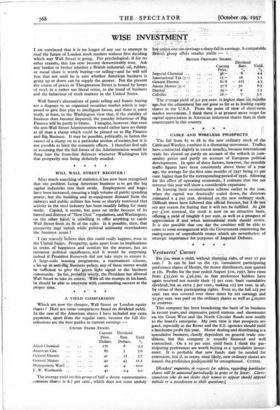WISE INVESTMENT
I AM convinced that it is no longer of any use to attempt to read the future of London stock markets without first deciding which way Wall Street is going. For psychological, if for no other reasons, this has now become demonstrably true. Ask any banker or broker whether a British industrial, oil, rubber, or metal share is worth buying—or selling—and he will tell you that not until he is sure whether American business is going up or down can he supply the answer. For the present the course of prices in Throgmorton Street is bound by hoops of steel, in a rather too literal sense, to the trend of business and the behaviour of stock markets in the United States.
Wall Street's alternations of panic selling and frantic buying are a disgrace to an organised securities market which is sup- posed to give free play to intelligent forces, and there is some truth, at least, in the Washington view that, if the stability of business does become impaired, the panicky behaviour of Big Finance will be partly to blame. I imagine, however, that even the anti-Wall Street Administration would rather have no slump at all than a slump which could be pinned on to Big Finance and Big Business. It may be possible, politically, to fasten the causes of a slump on to. a particular section of society, but it is not possible to limit the economic effects. I therefore feel safe in assuming that the full forces of the Administration would be flung into the front-line defences whenever Washington felt that prosperity was being definitely assailed.


























































 Previous page
Previous page